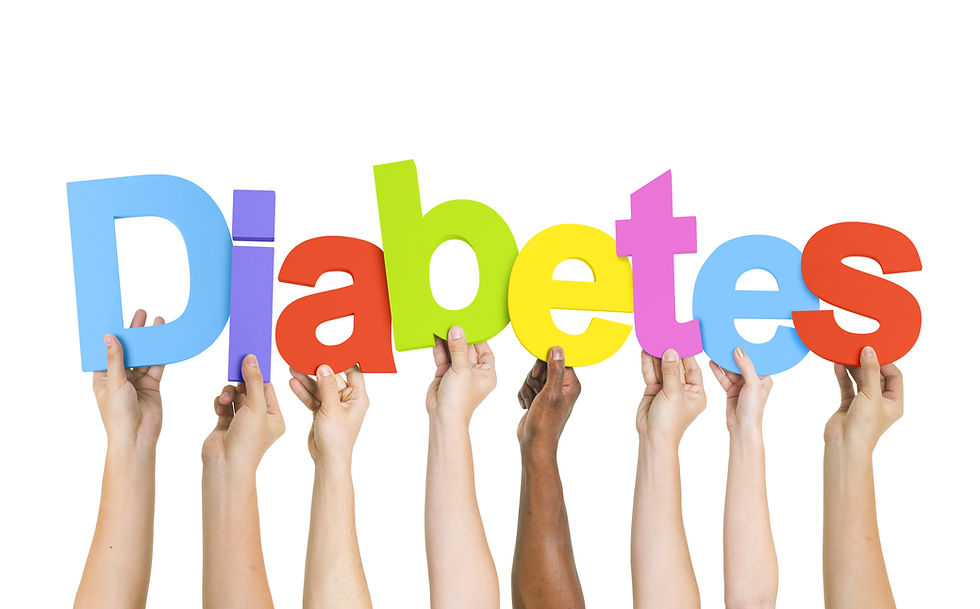Insulin Level and the Risk of Cancer, Diabetes: Berberine may be the Answer by Lowering Insulin while Lowering Glucose.
- David S. Klein, MD FACA FACPM

- Sep 9, 2025
- 4 min read
Nutraceutical Approaches to Lowering Insulin and Supporting Diabetes Management & Weight
Berberine: An AMPK Activator with Insulin-Lowering Effects
Berberine, an isoquinoline alkaloid extracted from plants like Berberis vulgaris, is one of the most extensively studied natural compounds for metabolic health. Its primary mechanism involves the activation of AMP-activated protein kinase (AMPK), often described as a “metabolic master switch.” By activating AMPK, berberine enhances glucose uptake in skeletal muscle, reduces hepatic glucose production, and improves overall insulin sensitivity. Clinical trials demonstrate that berberine can lower fasting glucose, HbA1c, and fasting insulin to an extent comparable with first-line pharmaceuticals such as metformin. Additional benefits include improvement in lipid profiles and favorable modulation of gut microbiota, both of which reduce the systemic inflammation that contributes to insulin resistance. Berberine lowers insulin and blood sugar simultaneously.
Chromium Picolinate and Vanadyl Sulfate: Trace Elements Influencing Insulin Action
Chromium, especially in the form of chromium picolinate, functions as a cofactor that enhances insulin receptor activity and improves intracellular signaling. Supplementation has been shown in human trials to improve glucose tolerance, lower fasting glucose, and reduce insulin resistance — though effects tend to be most pronounced in individuals with suboptimal chromium status. Vanadyl sulfate, a form of the trace mineral vanadium, mimics insulin at the receptor level and activates downstream pathways to promote glucose uptake while suppressing hepatic glucose output. Clinical studies show that vanadyl sulfate can lower blood glucose and improve insulin sensitivity in type 2 diabetes, but its long-term use is limited by safety concerns related to gastrointestinal tolerance and potential toxicity. Both agents highlight how micronutrients can intersect with cellular insulin signaling, but they should be used with medical oversight.
Inositol: Restoring Second Messenger Function in Insulin Signaling
Inositol, particularly myo-inositol and D-chiro-inositol, serves as a critical second messenger in insulin signaling. When this pathway falters, tissues become less responsive to insulin, perpetuating hyperinsulinemia. Supplementation with inositol has been shown to restore proper signaling, improving insulin sensitivity and lowering both glucose and fasting insulin levels. Clinical studies in women with polycystic ovary syndrome (a condition tightly linked to insulin resistance) show improved ovulation, reduced androgen excess, and better metabolic profiles. In the broader population with metabolic syndrome or diabetes, inositol supplementation has demonstrated modest improvements in HOMA-IR, triglycerides, and HbA1c, supporting its role as a low-risk adjunct to diet and exercise.
Olive Leaf Extract: Harnessing Polyphenols for Metabolic Health
Olive leaf extract, derived from Olea europaea, contains powerful polyphenols such as oleuropein and hydroxytyrosol, compounds also abundant in extra-virgin olive oil. These molecules exert antioxidant and anti-inflammatory effects but also act directly on glucose metabolism. Mechanistically, olive leaf polyphenols enhance glucose uptake in peripheral tissues, increase GLUT4 translocation, and reduce oxidative stress that impairs insulin signaling. Human trials have shown that olive leaf supplementation can lower fasting glucose and HbA1c while improving lipid profiles and reducing inflammatory markers. Because of its cardiovascular benefits and general safety, olive leaf extract is emerging as a promising complementary intervention for those at risk of or living with type 2 diabetes.
References
Berberine
Yin J, Xing H, Ye J. Efficacy of berberine in patients with type 2 diabetes mellitus. Metabolism. 2008;57(5):712-717. PubMed
Zhang Y, Li X, Zou D, et al. Treatment of type 2 diabetes and dyslipidemia with the natural plant alkaloid berberine. J Clin Endocrinol Metab. 2008;93(7):2559-2565. PubMed
Dong H, Wang N, Zhao L, Lu F. Berberine in the treatment of type 2 diabetes mellitus: a systemic review and meta-analysis. Evid Based Complement Alternat Med. 2012;2012:591654. PubMed
Deng Y, Zhang Q, Li Y, et al. Berberine attenuates insulin resistance by enhancing insulin signaling and AMPK pathway in high-fat diet induced obese mice. Nutrients. 2020;12(9):2688. PubMed
Lan J, Zhao Y, Dong F, et al. Meta-analysis of the effect and safety of berberine in the treatment of type 2 diabetes mellitus, hyperlipemia and hypertension. J Ethnopharmacol. 2015;161:69-81. PubMed
Chromium Polynicotinate & Vanadyl Sulfate
Anderson RA, Bryden NA, Polansky MM, et al. Chromium supplementation of human subjects: effects on glucose, insulin, and lipids. Metabolism. 1997;46(8):1-10. PubMed
Balk EM, Tatsioni A, Lichtenstein AH, Lau J, Pittas AG. Effect of chromium supplementation on glucose metabolism and lipids: systematic review of RCTs. Diabetes Care. 2007;30(8):2154-2163. PubMed
Martin J, Vincent JB. Mineral-dependent insulin-mimetic compounds: vanadium, chromium, zinc, and selenium. J Trace Elem Med Biol. 2007;21(1):59-65. PubMed
Bal A, Singh AK. Effect of vanadium and its compounds on carbohydrate metabolism. Endocr Pract. 2008;14(7):886-889. PubMed
Waring MJ, Sanders JA. Tolerance of diabetics to oral vanadyl sulfate. Diabetes Res Clin Pract. 1995;28(1):57-60. PubMed
Inositol & Olive Leaf Extract
Pintaudi B, Di Vieste G, Bonomo M. Myo-inositol may improve insulin resistance and metabolic syndrome in type 2 diabetes patients. Int J Endocrinol. 2016;2016:9132054. PubMed
Nestler JE, Jakubowicz DJ. Decreases in ovarian cytochrome P450c17α activity and serum free testosterone after reduction of insulin secretion in PCOS with D-chiro-inositol. N Engl J Med. 1999;340(17):1314-1320. PubMed
Konstantinidou V, et al. In vivo nutrigenomic effects of virgin olive oil polyphenols within the frame of the Mediterranean diet: modulation of inflammation and oxidative stress in humans. BMC Genomics. 2010;11:253. PubMed
Wainstein J, Ganz T, Boaz M, et al. Olive leaf extract improves insulin sensitivity in humans. J Med Food. 2012;15(7):605-610. PubMed
Lockyer S, Rowland I, Spencer JP, et al. Impact of phenolic-rich olive leaf extract on blood pressure, plasma lipids and inflammatory markers: randomized controlled trial. Eur J Nutr. 2017;56(4):1421-1432. PubMed
David S. Klein, MD, FACA, FACPM
1917 Boothe Circle, Suite 171
Longwood, Florida 32750
Tel: 407-679-3337
Fax: 407-678-7246
















.webp)